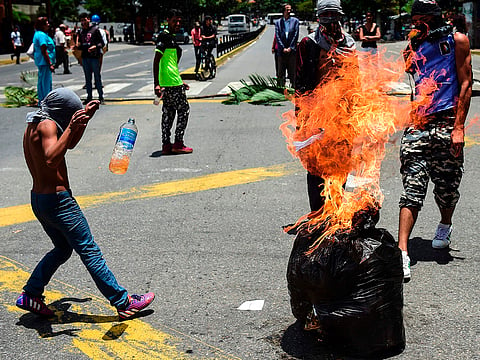US hits Venezuela with new sanctions
Measures aimed at six members of all-powerful Constituent Assembly set up by 'dictator' Maduro

Caracas: The United States imposed new sanctions on crisis-hit Venezuela on Wednesday, targeting members of a controversial, all-powerful, loyalist assembly installed last week to bolster what Washington calls the “dictatorship” of President Nicolas Maduro.
The measures were aimed at six members of the so-called Constituent Assembly — among them the brother of late president Hugo Chavez — as well as a military officer in charge of security for the body, and a board member of the national electoral authority.
They added to previous US sanctions on Maduro himself — a rare step against a sitting head of state — imposed just before the assembly was elected on July 30 in a vote marred by violence, fraud allegations and an opposition boycott.
“President Maduro swore in this illegitimate Constituent Assembly to further entrench his dictatorship, and continues to tighten his grip on the country,” US Treasury Secretary Steven Mnuchin said in a statement.
“This regime’s disregard for the will of the Venezuelan people is unacceptable, and the United States will stand with them in opposition to tyranny until Venezuela is restored to a peaceful and prosperous democracy.”
The announcement came as the Constituent Assembly and Venezuela’s supreme court took actions to limit the opposition’s ability to challenge Maduro.
The assembly has established a “truth commission” which Maduro has said he wants to examine alleged crimes by opposition leaders — especially those in charge of the country’s legislature, which his Socialist Party lost control of two years ago.
Sweeping powers
The assembly also fired the attorney general, Luisa Ortega, who broke ranks to become an outspoken critic of the president.
The supreme court ordered the jailing of an opposition mayor who allowed anti-government protests in his Caracas district, and was mulling similar cases against others.
Ostensibly brought in to rewrite the constitution, the Constituent Assembly has sweeping powers to override all other branches of government.
It has vowed to remain in operation for up to two years — beyond the scheduled end of Maduro’s term in 2019.
Those targeted in the US sanctions announced Wednesday included Adan Coromoto Chavez, the brother of the late president who was Maduro’s mentor before he died of cancer in 2013.
The National Electoral Council board member, Tania D’Amelio Cardiet, was designated for defending the assembly and for suspicion of being involved in fraud in its choosing.
The security official, Bladimir Humberto Lugo Armas, “has been involved in several acts of violence against National Assembly opposition members,” including against the body’s leader, Julio Borges, the US statement said.
The sanctions freeze the US assets of those targeted and ban American entities from doing business with them.
Battling isolation
Major Latin American nations and Canada have also rejected the legitimacy of the Constituent Assembly and slammed Venezuela for “breaking democratic rule.”
The UN rights office has also condemned “excessive force” by Venezuelan security forces against protesters who objected to the Constituent Assembly and who are angry about an economic crisis that has made food and medicine scarce amid hyperinflation and a nosediving currency.
Since the protests turned violent four months ago, nearly 130 people have died.
Protests against Maduro have become muted in the past week, however, as the Constituent Assembly started sitting and intensified a clampdown, though the opposition has urged demonstrators to continue.
The opposition coalition on Wednesday said it would field candidates in overdue regional elections set for December 10 to pressure Maduro to make sure they are held, and with an eye to winning most of Venezuela’s 23 states.
Although broadly criticized, Venezuela is not entirely isolated internationally.
It can count on the support of Russia and China — which have granted tens of billions of dollars in loans to Venezuela.
On Tuesday, Caracas hosted a number of leftist allies, including Cuba, Bolivia and Ecuador, as well small Caribbean nations to which it gives cheap oil, in a meeting to show solidarity.
Maduro told the representatives he was open to regional dialogue — as long as Venezuela was “respected.”
The leader reaffirmed that the difficulties he was facing were driven by an “imperialist” United States that wanted Venezuela’s oil.
“Venezuela is the big prize, the jewel of the crown — that’s what they say in the corridors in Washington,” he said.



